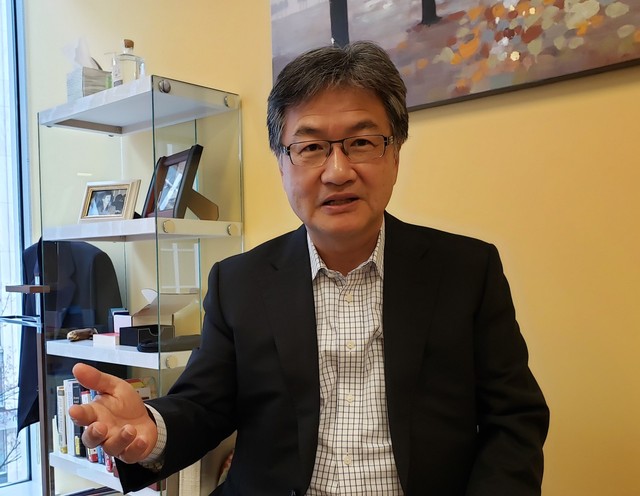 |
|
Joseph Yun, former US State Department special representative for North Korea policy (Hwang Joon-bum)
|
Joseph Yun analyzes what’s Moon and Trump need to do revamp NK-US negotiations
Joseph Yun, former special representative for North Korea policy at the US State Department, said that South Korean President Moon Jae-in’s biggest job in the upcoming South Korea-US summit in Washington, DC on Apr. 11 is to persuade the US to initiate dialogue aimed at a third North Korea-US summit. On Apr. 5, the Hankyoreh sat down with Yun at his office at the Asia Group in Washington, where he serves as a senior advisor. Hankyoreh (Hani): What do you think the results of the South Korea-US summit ought to be? Yun: Moon Jae-in played a leading role in North Korea-US dialogue, and we also have him to thank for the easing of tensions on the Korean Peninsula. Donald Trump wants him to keep playing a role. Even though the second North Korea-US summit concluded without an agreement, Trump and Kim Jong-un think they have a good relationship. Moon’s primary job is to complement Trump and Kim’s relationship and to help them develop a plan for future dialogue. Hani: One idea that’s being discussed is providing North Korea with sanctions relief, including resuming operations at the Kaesong Industrial Complex and tourism to Mt. Kumgang, on the condition of a snapback [reinstating sanctions if the North doesn’t keep its side of the bargain]. Yun: For now, it’s too early to talk about how open the US is to easing sanctions. Hani: There are claims in some sectors that the South Korea-US alliance is in crisis. What would you say is the reason for that? Yun: There’s no reason whatsoever to think there’s a crisis. I think [the reason there’s talk of a crisis] is purely domestic politics in South Korea. Conservatives use the South Korea-US alliance to criticize the progressives, and the progressives use inter-Korean relations to criticize the conservatives. Hani: What do North Korea and the US need to do to get dialogue going again? Yun: North Korea needs to clarify its definition of denuclearization. The North calls for the denuclearization of the Korean Peninsula, but the American position is that there are already no nuclear weapons in South Korea. North Korea furthermore needs to offer a roadmap for complete denuclearization. If it did so, the US would be able to talk about how much sanctions can be eased. Both sides are also open to setting up a liaison office and declaring the end of the Korean War. At that point, a mid-level agreement would be possible. Hani: During the Hanoi summit, the US proposed a very high-level concept of denuclearization that included shipping nuclear weapons to the US, and it has been sticking to an all-or-nothing position. Yun: “All or nothing” is just a phrase; there’s no such thing as “all or nothing” in negotiations. It’s not reasonable to expect that no sanctions will be lifted until complete denuclearization. The US is pushing North Korea to take a major step toward denuclearization, to which it would likely respond by exercising flexibility. Hani: What kind of message should Moon send to Kim after his visit to the US? Yun: I think Moon will tell Kim he needs to show the sincerity and determination to take major steps toward denuclearization. Shutting down the Yongbyon nuclear complex by itself isn’t enough to gain sanctions relief. North Korea has promised to shut the complex down several times now, and a lot of people are tired of hearing about it and don’t think the US is obliged to give anything in return. Hani: Do you think the top-down method will remain effective in North Korea-US dialogue in the future? Yun: The top-down method has to be accompanied by dialogue on a lower level. The Hanoi summit failed because the working-level dialogue failed to produce something that the leaders could deal with. The result was that Kim and Trump arrived at Hanoi with different expectations. There have to be several rounds of working-level dialogue before a summit. By Hwang Joon-bum, Washington correspondent Please direct comments or questions to [english@hani.co.kr]






